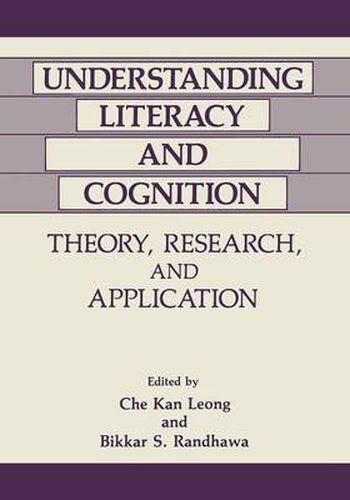Readings Newsletter
Become a Readings Member to make your shopping experience even easier.
Sign in or sign up for free!
You’re not far away from qualifying for FREE standard shipping within Australia
You’ve qualified for FREE standard shipping within Australia
The cart is loading…






This title is printed to order. This book may have been self-published. If so, we cannot guarantee the quality of the content. In the main most books will have gone through the editing process however some may not. We therefore suggest that you be aware of this before ordering this book. If in doubt check either the author or publisher’s details as we are unable to accept any returns unless they are faulty. Please contact us if you have any questions.
What does it me an to be literate? What does it mean to be a cognizing individual? What is the nature of cognizing? These are not new questions. They have been treated as philosophical puzzles to be pondered systema tically in the hope of some eventual solution. They have also been viewed as sets of language games with their own rules to enable the individual to understand the world. These age-old and significant issues gain renewed meaning with our advances in technology and neurosciences. Psychologists and educators would need to be aware of the explicit knowledge needed to prepare their students to be literate individuals. These were some of the questions that a small number of psychologists, educators, and computer scientists attempted to answer when they gathered for the Symposium Literacy and Cognition, which was held at the University of Saskatchewan, Saskatoon, Canada from 29th to 31st October, 1987. The occasion also marked the sixtieth anniversary of the College of Education of the University, which had as its beginning the Normal School for the Province of Saskatchewan. We are grateful to the presenters for their presentations and their written papers, and also to our other colleagues from the United States and Sweden for their contributions to the multi faceted theme of literacy and cognition. There are many other people whom we would like to thank. These include: Dr. Sylvia Fedoruk, Chancellor of the University and Lieutenant Governor of Saskatchewan, for her opening remarks at the Symposium; Dr.
$9.00 standard shipping within Australia
FREE standard shipping within Australia for orders over $100.00
Express & International shipping calculated at checkout
This title is printed to order. This book may have been self-published. If so, we cannot guarantee the quality of the content. In the main most books will have gone through the editing process however some may not. We therefore suggest that you be aware of this before ordering this book. If in doubt check either the author or publisher’s details as we are unable to accept any returns unless they are faulty. Please contact us if you have any questions.
What does it me an to be literate? What does it mean to be a cognizing individual? What is the nature of cognizing? These are not new questions. They have been treated as philosophical puzzles to be pondered systema tically in the hope of some eventual solution. They have also been viewed as sets of language games with their own rules to enable the individual to understand the world. These age-old and significant issues gain renewed meaning with our advances in technology and neurosciences. Psychologists and educators would need to be aware of the explicit knowledge needed to prepare their students to be literate individuals. These were some of the questions that a small number of psychologists, educators, and computer scientists attempted to answer when they gathered for the Symposium Literacy and Cognition, which was held at the University of Saskatchewan, Saskatoon, Canada from 29th to 31st October, 1987. The occasion also marked the sixtieth anniversary of the College of Education of the University, which had as its beginning the Normal School for the Province of Saskatchewan. We are grateful to the presenters for their presentations and their written papers, and also to our other colleagues from the United States and Sweden for their contributions to the multi faceted theme of literacy and cognition. There are many other people whom we would like to thank. These include: Dr. Sylvia Fedoruk, Chancellor of the University and Lieutenant Governor of Saskatchewan, for her opening remarks at the Symposium; Dr.